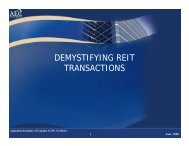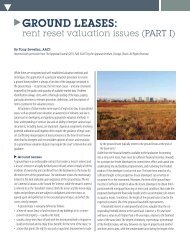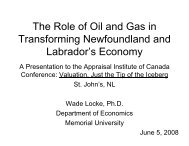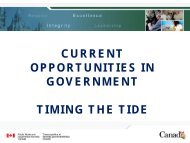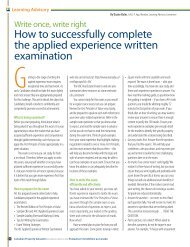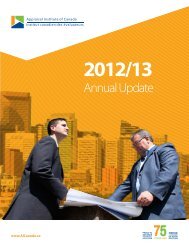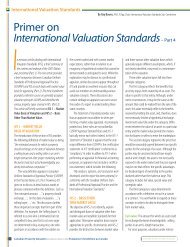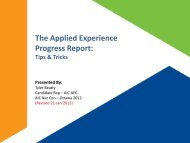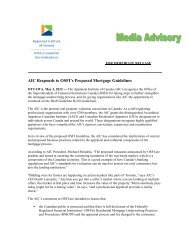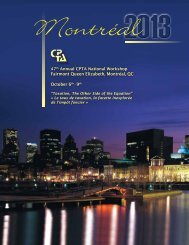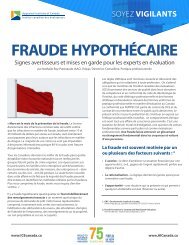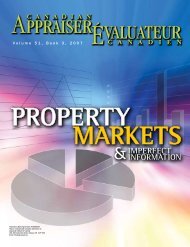Book 1 - Appraisal Institute of Canada
Book 1 - Appraisal Institute of Canada
Book 1 - Appraisal Institute of Canada
You also want an ePaper? Increase the reach of your titles
YUMPU automatically turns print PDFs into web optimized ePapers that Google loves.
Legal news & viewsBy Ludmila Herbst, LL.B., Farris, Vaughan, Wills & Murphy LLP, Vancouver, British ColumbiaEvolving courtrules on expert evidenceAppraisers providing expert evidence inseveral Canadian courts – includingthe Ontario Superior Court, the NovaScotia Supreme Court and (as <strong>of</strong> July 1, 2010) theBC Supreme Court – face changes in the courtrules which govern expert witnesses’ reportsand roles. The changes to these trial courts’ rulesinclude (1) new requirements for expert witnessesto state in their reports that their evidenceis given objectively or in accordance with aduty to assist the court (the wording varies byprovince), with this prevailing over obligationsto the party by whom they are retained; and (2)in some jurisdictions, particularly in BC, greaterencouragement for opposing litigants to jointlyretain a single expert. Both types <strong>of</strong> change areintended to reduce the cost and acrimony associatedwith ‘battles <strong>of</strong> experts’ and to make expertevidence more helpful to the courts in which thechanges are instituted.Court rules requiring acknowledgment <strong>of</strong>experts’ duties may alter little in the substantiveapproach <strong>of</strong> those witnesses who belong topr<strong>of</strong>essional organizations (such as the <strong>Appraisal</strong><strong>Institute</strong> <strong>of</strong> <strong>Canada</strong>) which set standards thatalready encourage objectivity and, indeed,provide for written certifications <strong>of</strong> impartiality.The new judicial requirement may have a greaterinfluence on the content <strong>of</strong> reports in previouslyless regulated fields or fields where a ‘hired gun’mentality seems to be widespread; in thosefields, experts required to acknowledge theirobjectivity may think twice about their approach.More broadly, it is possible that partisanshipby an expert witness in breach <strong>of</strong> his orher written commitment to be objective or toassist the court could now expose that witnessto sanctions directly from the court, rather thansimply from the pr<strong>of</strong>essional organization, ifany, to which the expert belongs. The case law inthe absence <strong>of</strong> these court rules has traditionallypermitted courts to take a less direct approach,where they may (1) ‘punish’ the litigant whoseexpert has been partial, by refusing to admitthe expert’s report into evidence or giving littleweight to it (thus leaving a gap in that litigant’scase); and/or (2) criticize experts for lack <strong>of</strong>objectivity in the course <strong>of</strong> reasons for judgementon the broader issues. What additional steps, ifany, that the courts will take under the new rulesremains to be seen.Certain <strong>of</strong> the new court rules also address thejoint appointment by parties <strong>of</strong> a single expertto opine on particular issues. The Nova Scotiarules provide for joint appointment on agreement<strong>of</strong> the parties. The BC rules go further, both insetting out a detailed protocol for joint appointmentsand in providing that the BC SupremeCourt will have the power to order that the expertevidence on one or more issues be given by onejointly instructed expert, even if neither partyhas requested that such an order be made. Intheory, the appointment <strong>of</strong> a single expert shouldreduce the expense to parties, as they will be ableto share costs. Given the requirement even forexperts retained by a single party to be impartialrather than to serve as the retaining party’sadvocate, the conclusions in the jointly procuredreport should also, in theory, be the same as inreports which were separately obtained. However,concerns have been raised over how well thistheory will translate into practice, and indeed theconcept <strong>of</strong> joint appointment has not found itsway into the new Ontario rules (although theydo encourage party agreement on the selection<strong>of</strong> court-appointed experts, a different issue).Concerns include that parties’ resources may beconsumed in fighting between themselves on theselection <strong>of</strong> a jointly appointed expert and theinstructions to be given to the expert, or in retaining‘shadow’ experts (whose evidence cannot,however, be filed on the same point withoutleave <strong>of</strong> the court) to review the jointly appointedexpert’s conclusions. It will be interesting to seehow the practice develops in this regard.click here to return to table <strong>of</strong> contentsCanadian Property Valuation Volume 54 | book 1 | 2010 Évaluation Immobilière au <strong>Canada</strong> 17



